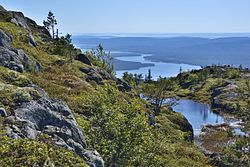Paanajärvi National Park (Russian: Национальный парк Паанаярви) is in Russian Karelia, by the Finnish border. It is largely wilderness, with rich wildlife and beautiful landscapes.
Understand
[edit]
The park, inaugurated in 1992, covers 1,040 km2 (400 sq mi) of taiga, lakes and rivers. It is adjacent to Oulanka National Park in Finland (but the closest border crossing is that of Kuusamo/Суоперя 50 km to the south, and getting a permit to cross directly is probably hard to get).
- 1 National Park Visitor Centre Paanajärvi (Визит-центр Национального парка «Паанаярви») (in Pyaozersky), ☏ +7 81439 4-85-04, [email protected].
History
[edit]
The Paanajärvi area was part of Finland from Swedish times until World War II. The village Paanajärvi in the western end of the namesake lake belonged to Kuusamo, to which it had bus connection – along the only road, not ploughed in winter until late 1930s.
Paanajärvi became a destination for tourists, artists and researchers in the end of the 1800s. Among the artists were Akseli Gallen-Kallela, Louis Sparre and the photographer I. K. Inha. Esko and Paavo Suomalainen published Suomen erämaiden kauneus ("The beauty of Finnish wilderness") in 1938, as one result of their research here.
The population of some 500 was evacuated to Finland after the war, Soviet 1950s Russification politics saw small villages as future-less and the village Paanajärvi is no more. The area is nowadays part of Kestenga in Loukhsky District of Russian Karelia.
The Paanajärvi village was in the western end of the lake, with the sides connected by ferry. The church was on the southern shore (with the road), while most population was on the northern shore.
The park was inaugurated in 1992.
Landscape
[edit]The park is in the Maaselkä hills along the border to Finland. The 576.7-m Nuorunen (Нуорунен) is the highest peak in the Republic of Karelia. The area also has several lakes, the largest being Paanajärvi, 23.5 km long (west–east) and 120 m at its deepest, but only 0.5–1.5 km wide. There are many impressive rapids. Water covers 10% of the park.
Flora and fauna
[edit]The area belongs to the Eurasian taiga belt, stretching through Russia to the Pacific Ocean.
Climate
[edit]The park is in the inland close to the Arctic Circle. Winters are harsh with deep snow, although not as bitter as in Siberia, while summers are reasonably warm. Temperatures extremes range from −50 °C (−58 °F) in winter to 30 °C (86 °F) in summer, while temperatures of −15 °C (5 °F) to +15 °C (59 °F) are more common.
Get in
[edit]The visitor centre is in Pyaozersky (Karelian: Piäjärvi) 700 km (430 mi) north-west from Petrozavodsk, the Karelian capital. The district capital Loukhi is by the Murmansk highway 500 km north from Petrozavodsk. Both these are on the Murmansk railway. The "highway" between Loukhi and the border crossing to Kuusamo in Finland passes Pyaozersky (110 km from Loukhi). You could also come via Kalevala, south from Pyaozersky, and turn west when reaching the highway.
There is a small road from Pyaozersky northward to the park. You might also be able to get a ride by boat.
Fees and permits
[edit]You need to buy a permit to visit the park. Much of the park is in the border zone, for which permits are probably difficult to get.
Get around
[edit]See
[edit]
- 1 Kivakka (Гора Кивакка). A 499.5-m fell.
- 2 Nuorunen (Гора Нуорунен). The highest peak in the Republic of Karelia, at 577 m.
- 3 Kivakkakoski. Rapids of Oulankajoki.
- 4 Mäntykoski (Водопад Мянтюкоски, Сосновый порог). Falls of Mäntyjoki.
- 5 Paanajärvi (Озеро Паанаярви). The lake that has given its name to the park.
- 6 Mäntytunturi (Гора Мянтютунтури). Fell of 550 m.
- 7 Oulankajoki (Река Оланга). The main river, coming from Oulanka National Park.
- Ruskeakallio (Скала Рускеакаллио). Cliff face.
Do
[edit]Buy
[edit]Eat
[edit]Drink
[edit]Sleep
[edit]Lodging
[edit]Camping
[edit]Backcountry
[edit]Stay safe
[edit]This is backcountry; take care of yourself. There is little mobile phone coverage, mostly what happens to leak from Finland (Telia), and Finnish rescue services do not operate here (they might be able to summon Russian authorities, but hardly in any timely manner).

